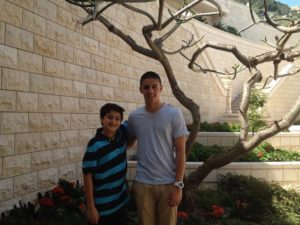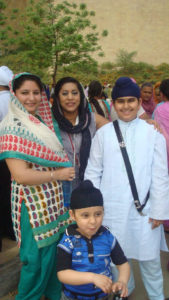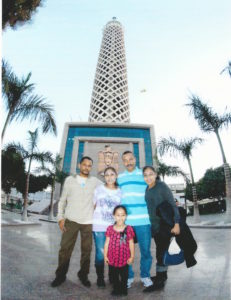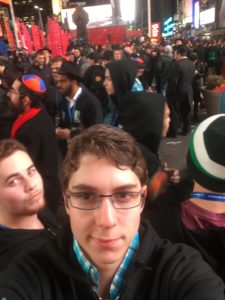Bayan Dadressan – Baha’i Faith
 Senior Bayan Dadressan, one-third of Northwood’s Nuthouse leadership team and a member of DECA, is a practicing follower of the Baha’i faith. This religion originated in Iran, where Dadressan’s family is from, and focuses on teaching about unity, the worth of all religions, and equality among all people.
Senior Bayan Dadressan, one-third of Northwood’s Nuthouse leadership team and a member of DECA, is a practicing follower of the Baha’i faith. This religion originated in Iran, where Dadressan’s family is from, and focuses on teaching about unity, the worth of all religions, and equality among all people.
Dadressan is thankful that his parents emphasized the importance of “unity” and “bringing people together” throughout his childhood. Now, he places a lot of importance on how their influence guided him to become who he is today.
“I definitely think [my religion] has affected how I’ve grown up,” Dadressan said. “My family really tried to connect me to the faith, and I think they did a really good job having me find my own path and not trying to force my connection with a religion.”
Every year, Dadressan and his family go to pilgrimage in Haifa, Israel to visit the Baha’i temples and shrines that serve as places for people of all religions to worship without restrictions. He even applied to spend a year doing service through his religion in Haifa.
“I applied for administration,” Dadressan said. “Basically that means that for a year I’d be working with people traveling to Israel for pilgrimage by helping them get around and telling them about local religious opportunities.”
Jaspal Singh – Sikhism
 Senior Jaspal Singh traces the biggest influences on his life to more than just his religion, Sikhism, a monotheistic religion founded in the Punjab region of India. He credits having grown up in a minority household as well.
Senior Jaspal Singh traces the biggest influences on his life to more than just his religion, Sikhism, a monotheistic religion founded in the Punjab region of India. He credits having grown up in a minority household as well.
“There are always those stereotypes of how religious and minority parents bring you up,” Singh said. “It’s pretty different than the way that [traditional] American families bring up their kids, and I think that it has had nothing but a positive effect on me.”
Throughout Singh’s childhood, he traveled to India to visit Sikh temples with his grandparents and attended summer camps devoted to teachings of the Sikh faith.
“Both of these events had a major effect on the way that I’ve grown up,” Singh said. “[They] changed me as a person, and I feel like after, I became more religious, because they were so eye-opening for me.”
Singh believes religion can have this same effect on anyone.
“I feel like no religion, at its basest level, preaches anything immoral,” Singh said. “They’re all pretty much good ideas for the most part, and they’re just intended to make you a better person.”
Tala Farah – Islam
 “I wish I could say my religion had an effect on me, but I don’t really think it did,” Farah said. “My culture at home hasn’t changed anything, because my culture at home is basically an American culture, just with different practices.”
“I wish I could say my religion had an effect on me, but I don’t really think it did,” Farah said. “My culture at home hasn’t changed anything, because my culture at home is basically an American culture, just with different practices.”
The Islamic religion is an Abrahamic faith following Muhammad as the Prophet of Allah. Farah classifies her family as “not very strict” when it comes to religion.
“We pray five times a day and we cover ourselves, but you don’t see me wearing a hijab to school,” Farah said.
Every year while Farah was growing up, her family would visit their relatives in Sudan and Egypt. She attributes religious influence to the cultural differences she has noticed.
“The culture is much different over there,” Farah said. “When you go to Sudan, the people are so open with each other; you expect at least 20-30 people coming to your house every single day saying, ‘Hi! How are you?’ But you also see the people being judgmental. For example, when I go there, I’m always getting weird looks, because I’m so absorbed into this American culture, wearing my casual clothes, while they are wearing full fabric with a hijab covering their face.”
Joshua Sickels – Judaism
 Senior Joshua Sickels, a follower of the Abrahamic religion Judaism, is another student who attributes much of who he is to his religion.
Senior Joshua Sickels, a follower of the Abrahamic religion Judaism, is another student who attributes much of who he is to his religion.
“I definitely think [growing up in a Jewish household] had an effect on me,” Sickels said. “Jews are very hardworking and ethic-centric, so my parents really pushed me when I was growing up to do better and to do a lot of community service, because that’s a huge part of Jewish culture as well.”
Sickles wears a yamaka in religious devotion and says this led to discrimination from other students in his younger years.
“In my earlier years, there was definitely a traditional sense of light bullying and name calling,” Sickels said. “It doesn’t really bother you after a while, because you just kind of get used to it.”
The summer before his junior year, Sickels went on a religious retreat called CTeen in New York to spend one Shabbat (Judaism’s day of rest) with teens from all over the world.
“We took classes to learn more about Judaism and did prayers,” Sickels said. “Also, there are no electronics allowed, so it was kind of a day to unplug.”

